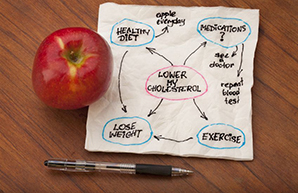The “good” cholesterol is called high density lipoprotein (HDL).
“It gathers up excess cholesterol and carries it back to the liver where it can be broken down for removal from the body. It can also help to remove some of the cholesterol already deposited on the artery walls,” says Dr Martie de Wet from the Life Extension Institute in Johannesburg.
You can increase your level of HDL with exercise and loss of excess weight. “HDL is lowered if you carry too much weight, don’t do enough exercise, or you smoke 20 or more cigarettes per day. Another reason for a low level of HDL is hypertriglyceridaemia (high levels of fatty molecules in the blood),” she says.
High levels of triglycerides can cause thickening of the artery walls which predisposes you to cardiovascular disease, the result of which can be heart attacks or strokes. Another reason for lower levels of HDL is that you are genetically programmed to be that way.
What is “bad”cholesterol?
Low density lipoprotein (LDL) is the bad cholesterol that builds up in the arteries causing the gradual narrowing of the arteries.
“Levels of LDL are elevated by diets high in fat (especially saturated fat) and cholesterol, obesity, diabetes, hypothyroidism (underactive thyroid) and hyperlipidaemia (high level of triglycerides),” explains Dr de Wet.
Keep your cholesterol at a healthy level by following these 7 tips:
- Eat soluble fibre. This helps to get rid of excess cholesterol which can lower LDL cholesterol and improve heart disease. Oats, fruits, vegetables, legumes and psyllium are all great sources of soluble fibre.
- Eat fresh. Fruits, vegetables (at least five servings), whole grains, olive oil, nuts and fatty fish are essential. Cut down on saturated fats (animal fats) and trans-fats (processed foods, fast foods).
- Get moving. Follow a combination of cardiovascular and strength training exercise most days of the week.
- Don’t smoke. Chemicals found in cigarettes have a direct effect on how well your body is able to use HDL cholesterols to get rid of those harmful fats and toxins.
- Ease up on the alcohol. Don’t drink more alcohol than recommended.
- Stay on the lighter side. Maintain a healthy weight.
- Find ways to unwind. Manage your stress effectively.
Check your levels
Dr de Wet recommends that you get your cholesterol levels checked annually, especially if you are at risk of raised cholesterol levels. The test report will show cholesterol levels in milligrams per decilitre of blood (mg/dL). If your good cholesterol is lower than the recommended range, and your bad cholesterol is raised, your health practitioner will advise you on the best way to correct it.
You can get your cholesterol tested at any Clicks Clinic. Call 0860 254 257 to make an appointment.

